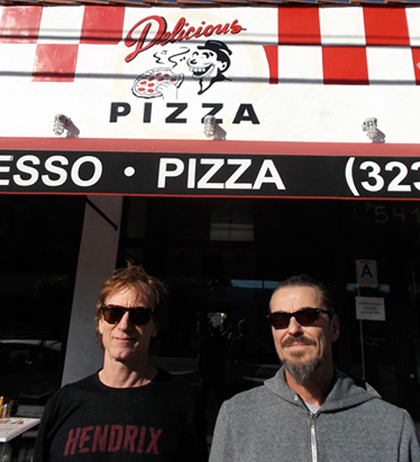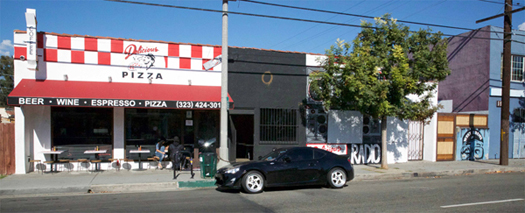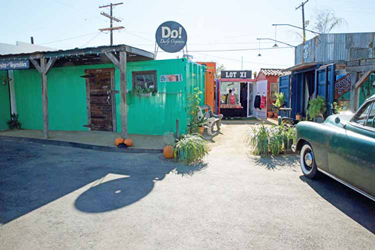Delicious Pizza and Building Community on West Adams Blvd.
- Details
- Category: Featured Local Business
- Published on Monday, 14 December 2015 19:04
- Written by D.V. Lawrence
 TNN: You guys show up on Adams and…. Boom! Revitalization! How did you find out about our community?
TNN: You guys show up on Adams and…. Boom! Revitalization! How did you find out about our community? Fred Sutherland: I lived in Venice for many years, but I worked in this neighborhood for the last twenty years.
TNN: Doing what?
FS: My buddy Kenny Scharf, has an art studio over on Adams and Sycamore. He's been painting in there forever and ever, and he's got one of those places that looks like it's abandoned on the outside and dangerous-
TNN: Kenny Scharf, [internationally famous artist] has a studio in our neighborhood?
FS: Yeah, he's been here forever.
TNN: How do I not know that?
FS: Because you can't tell by anything when you walk down the Boulevard. You come around the back, and he's got a nice, artsy painting studio. When you drive down Adams, it looks like everything's dangerous and abandoned, but when you walk down Adams, and you see what's going on, you see that it's not this scary, abandoned, derelict road full of empty storefronts. It's a really viable street full of business, but people tend to just come and go from the back. I can show you only three or four empty storefronts along the Boulevard, between here and Crenshaw. There's very few that are not being used, only a couple of abandoned ones. There's very, very little space that's not being used for something productive.
TNN: What did you do for him?
FS: Just helping him with whatever. We redid the space a little bit, made a little entrance in the back and made it all groovy. He's been painting in there and I've been helping him make his art in there, whatever, sculptures and stuff, forever.
TNN: So, you have been a part of this community for twenty years and now you live here?
FS: Yeah, I moved from Venice. When it was time to leave I was looking around at where I could go and I liked this neighborhood. Coming up here and working, I would see them working on that train and the more I saw the train, the more Jefferson was looking really beautiful. I'm thinking, "Man, this train is the key to this neighborhood!" We are at the center of everything, and now you can actually get out of here. You can get in, you can get out. The train is monumental. As for staying at the beach, I thought, "Forget it." I had started looking around here and it was affordable, and so I bought a house, and I tried to get all my friends, like, "Hey, man, this is the middle of town with the train! Come on by, come and look!"
TNN: What inspired you to put business roots down here?
FS: I realized that the neighborhood was not being fully served. Up until a year and a half ago, we had a few bodegas along here, overpriced bodegas and whatnot, which is fine, but we don't have any incidental stuff. Slowly, in the last six years or so, we now have a bunch of restaurants along here. We got Los Anaya’s, we've got the papusa restaurant, and the Frog, and Honey Bees. We’ve got Vintiques for vintage clothes. All these places have popped up. Even Vees Café, that’s been here seven years. As far as beyond the norm of what the neighborhood was, they were the pioneers. Subsequently, the local market has redone the inside and changed their product line to suit the neighbors. But we didn't have any pizza! All the Latin food you could want, no pizza. No Chinese food, no Japanese food, no nothing, so let's start with pizza, we need pizza. I drew a logo and I sent it to Mike, and I said, "Let's do delicious pizza."
TNN: Tell my about your partner Mike.
FS: Mike's a great guy and a friend of mine who owned the wildly popular Delicious Vinyl, a record label started in the '80s. He doesn't live in the neighborhood, but he likes the neighborhood and he sees the growth. He's investing his time and his energy into the neighborhood to try and make something better for the people who live around here. Offer something a little more soothing when you drive down the road. Make it a little safer to walk down the street. Pay a little more attention to what's going on. His record label was very popular, and their logo lent itself to pizza, just a perfect swap. I sent him the Delicious Pizza logo, and he said, "Yeah, I've always wanted to do a pizza place!"
I was looking around, we found a building, he bought the building, and then I renovated the building and, subsequently, it just seemed to work out. We did the pizza place and a little art gallery seemed to go with it very well. We have a space on the end here, which we're running a little gallery in now, but it's set up to be another restaurant. We're hoping to get a brand new restaurant vendor in there. It's all ready, all the plumbing and electricals in, we just need a tenant, so that's one more thing.
Across the street, we bought a building, and we put some artists in there. We’ve got an artist in there who is going to do fine art life drawing courses. It's to be an artists' studio on one side and a life drawing class in the front and the gallery, all in one. We bought that, we redid the front on it, so it looks clean. It doesn't look abandoned anymore. It looked really scary before.
 TNN:You have this building that houses Delicious Pizza and the building next door?
TNN:You have this building that houses Delicious Pizza and the building next door?FS: No, this is all one building, an art gallery, the radio station, this room we're sitting in, another art gallery, which is our dining room, and then the pizza place. The next one is an empty lot that we plan to develop later. That's this block. Across the street, we have that gallery, and then, down the road, where J & J Barbecue is, we bought that piece of property and we put in ten shipping containers in the back.
TNN: Renee Gunther’s Daily Organic’s is one of the pop ups.
FS: We put in those containers and I put the boxes in and set a little path, like, let's put businesses in and I rented all the spaces out, so now they've got a little container village going on over there. There's a hair salon in there, and a jeweler, and a realtor, along with J & J.
 TNN:All of that in one compound?
TNN:All of that in one compound? FS: We bought the whole chunk of land from the guy who had the woodpile there. He was done, so he sold us the property, and when he took his woodpile away, we put the containers in and paved the ground. There was an auto repair shop in there, and J & J, and the woodpile. When the auto repair shop left, I put in Carol and she does jewelry. There’s a realtor in there, and then we put in a hair salon. When the wood boy left, we put in containers.
On the other side of La Brea, on Adams, we have a building in there that's got artists living in it. We redid the front and painted it all, and then, across the road, opened another art gallery over there, 4900 Gallery.
TNN: There have been people living on this strip, involved in the community, who've been talking about the need to revitalize Adams for a long time, so it's just amazing-
FS: It's a paint job away, that's what I keep saying. It's a paint job away, because the people that live in the buildings are already there, and they're already cool. They're established businesses. There are craftsmen to make wood furniture, craftsmen to do upholstery. There's these churches, there's all kinds of little businesses, but they're all hiding, and that's the thing. There's a cat over here, he does all the grinding of all the lenses for the west side and Israel and he's got a booming business in there. He's one of the largest providers of lenses for Israel, and they grind twenty-four hours a day in that place, and it's one of the junkiest-looking buildings on the block. We've gone to him and like, "Hey, man. Why don't you just paint it?" "Oh, no, no, we can't. We won't paint it."
TNN:Why not?
FS: "We don't have any money!" It's really funny, because one of the guys, a manager that worked there, I told him, "Come on, let's go talk to your boss. I want to paint the building. You're so successful, you can certainly afford a quart of paint."
"No, we can't paint the building!!" (laughs)
TNN: Maybe they don't want people to know they're there?
FS: I don't know. It's just that it's really funny that it's super decrepit, and then the building right next to them is one of the three abandoned buildings in the area, so that's been sitting empty for forty years or something, unused.
TNN: Adams is a bit of a mystery to everybody. People have been saying, "Let's do something," or, "How do we get it to..."
FS: First, we had the riots, and that burned up a bunch of stuff, then the earthquake came, and knocked down a bunch of stuff. Between the two, we ended up with a bunch of weird situations along the Boulevard. That's how the lot next door came about. There was a building there and it got damaged in the riots, and then got damaged more in the earthquake, they had to tear it down. Same with another one down the block. There's one on the corner of Orange, the same thing happened there, and across the street from that, there was another building, same exact thing happened. The blighted parts are very small and everything else is occupied.
TNN: You're right. When you drive down it looks like nothing much is going on.
FS: Yeah, because everything's beige, and it's painted by the graffiti-buster guys who just put the beige on it, and we don't even have graffiti around here, really. We don't get taggers, really, We get a little bit of gang-tag every once in a while, where they come through and just do their thing and split. We don't have the day-to-day procession of kids running through, putting their name on everything.
TNN: When you started to become committed to investing in this community, did you have a vision, or did you just see opportunity and go for it?
FS: Well, a vision comes from a lot of people. I had a vision, I knew that this neighborhood was really awesome, and so I started telling everybody. "Look, you're missing it! Take a drive, but you're missing it, so come and look and see." I hate to sound gross, but the price is not even a speculator price, they're giving away buildings. People just put it up for sale and, no ... it doesn't make any sense. The prices don't relate to anywhere in the city along this Boulevard. It's changed, now, but five years ago and four years ago, it was ridiculous, and I'm trying to show everybody and they’re like - "What the hell, what do you want to be over there for?" For one, I can afford to be over here, and do something. I can afford to buy a commercial piece of property, and actually put a business in, because I'm not weighed down with huge rents and giant mortgage payments, so it's an opportunity. It's not so much like a real estate play, as it is just an opportunity to actually do something. You could come here, buy a house, and afford to live in it!
TNN: When you told me you'd been working here over twenty years, it's almost like you were in the right place at the right time with the right attitude.
FS: I'm familiar with the neighborhood, I've driven in it a million times, and I've never had or seen any problems. How bad can a neighborhood be, where the ladies are pushing baby carriages up and down the Boulevard all the time?
TNN: What obstacles have you encountered coming into this neighborhood, if any?
FS: Nothing. When white guys move into a neighborhood that's not predominantly white, people get skeptical about what your intentions are, but, it seems like the people who live in the neighborhood weren't investing in the neighborhood to make any difference, so, the fact that I'm white and I'm here shouldn't really make a difference. I'm not out to exploit anything and I don't want to tear anything down, either. I just want to be part of this community like everybody else. This is a neighborhood pizza shop. It's not beyond anybody, it's not exclusive. That's what we're trying to create, but with everything we are doing. The container village down the block, something that brings the people in. Not exclusive, but inclusive.
TNN:What surprised you the most about coming here?
FS: I was amazed at just how everyone was welcoming and happy to have us. For the most part, our neighbors really liked the fact that we were here, we just add more presence to the neighborhood, more lights on at night. We didn't tear the building down, we renovated. It's not about gentrification and taking over. People want more people to come in and offer their businesses.. I really enjoy it here, I like the people and I like the way it is. I don't want to change it. A lot of these people come in, the speculators do come in and I have to deal with them. They're like, "We'll get that and we'll just tear it down," and I'm like, "No! You're going to ruin it for us. This is the character, this is the neighborhood, let's keep this."
Categories
-
Featured Local Business
Fais Do Do. 28 Years Strong
 Standing like a sentinal at the entrance of what I like to refer to as the West Adams Gateway...
Standing like a sentinal at the entrance of what I like to refer to as the West Adams Gateway...
-
Featured Resident
The Editor Discovers Her Remarkable Ancestors
 I was born out of wedlock in 1951 to a beautiful Latvian immigrant woman, Inta Penka. In 1940...
I was born out of wedlock in 1951 to a beautiful Latvian immigrant woman, Inta Penka. In 1940...
-
Featured Teen
Roy Readmond
 While grandparents despair that the younger generation has been captured by twitter, instagram,...
While grandparents despair that the younger generation has been captured by twitter, instagram,...
-
Interviews
NEXT! Dianne V. Lawrence on wrapping up the hard copy of The Neighborhood News
 For 13 years, Dianne V. Lawrence has helmed The Neighborhood News, highlighting noteworthy...
For 13 years, Dianne V. Lawrence has helmed The Neighborhood News, highlighting noteworthy...
-
Leaders, Activists
Anthony Nicholas Remembers Rosa Parks
 This article is reprinted with permission from the World Tribune. For more information on that...
This article is reprinted with permission from the World Tribune. For more information on that...
Today5
Yesterday10
Week25
Month202
All988820
Kubik-Rubik Joomla! Extensions
Yesterday10
Week25
Month202
All988820
Currently are 109 guests and no members online
Kubik-Rubik Joomla! Extensions




